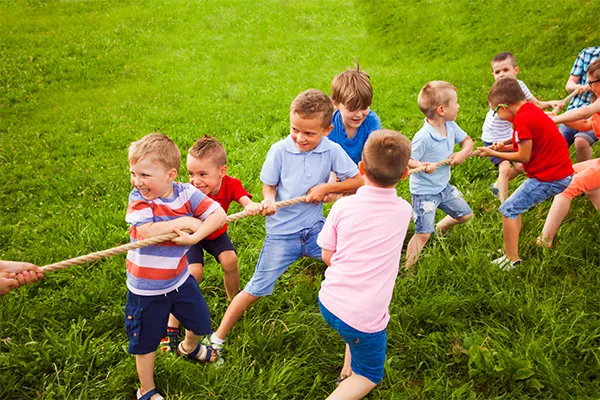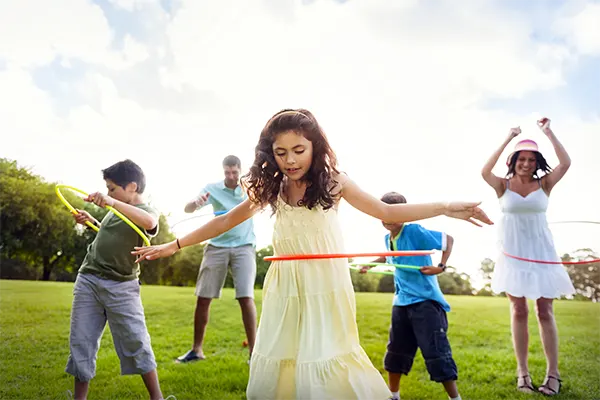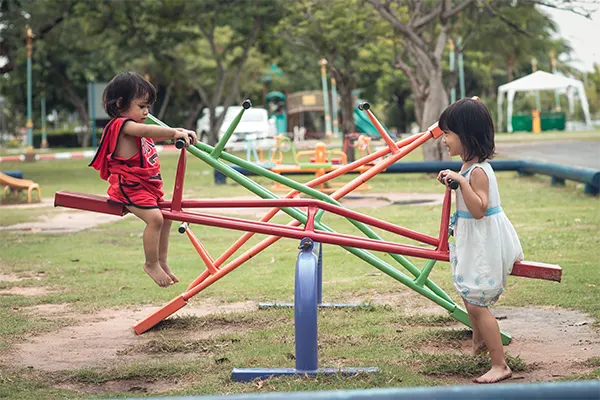In the dynamic landscape of modern childhood, where digital screens often usurp the traditional allure of outdoor activities, the question of “Why opt for outdoor games for kids?” becomes increasingly crucial. The enchantment of screen-based entertainment, while captivating, has inadvertently led to a decline in the exploration of the great outdoors. However, the significance of outdoor games transcends mere recreation; it stands as a fundamental pillar in shaping a child’s physical health, mental well-being, and overall development. Imagine a world where the laughter of children mingles with the rustling of leaves, where the vibrant colors of nature provide a canvas for boundless exploration, and where the joy of play becomes a transformative force. This is the world that outdoor games reintroduce, offering more than just a break from routine – they provide an essential foundation for growth, vitality, and holistic development.
The Physical Benefits:

Outdoor games serve as a gateway to physical vitality for kids in an age where concerns about sedentary lifestyles and childhood obesity are on the rise. The multifaceted nature of outdoor activities, encompassing activities like running, jumping, climbing, and engaging in sports, significantly contributes to the development of gross motor skills, coordination, and cardiovascular health. Beyond immediate health benefits, the joy of movement in the open air establishes habits that promote a healthy lifestyle, laying the groundwork for lifelong well-being.
- Development of Fine Motor Skills: Outdoor games often involve activities that necessitate the use of fine motor skills, such as picking up objects, manipulating tools, or handling equipment. These activities contribute to the refinement of hand-eye coordination and dexterity.
- Enhanced Balance and Spatial Awareness: Activities like climbing, balancing on uneven surfaces, or riding a bike enhance a child’s sense of balance and spatial awareness. These skills are crucial for navigating the physical world with confidence.
- Cardiovascular Fitness: Engaging in outdoor sports and activities promotes cardiovascular fitness, strengthening the heart and improving blood circulation. This foundation of physical health established in childhood lays the groundwork for a healthier adulthood.
Sunlight Exposure and Vitamin D: Outdoor play ensures exposure to natural sunlight, leading to the production of vitamin D. This essential vitamin is crucial for bone health, immune function, and overall well-being.

Mental Well-being and Stress Relief:

Going beyond the physical, outdoor games play a pivotal role in nurturing mental well-being. The natural environment, with its expansive open spaces and invigorating fresh air, serves as a potent stress reliever for children. Immersed in outdoor play, children experience a sense of freedom and a profound connection with nature, resulting in reduced anxiety levels and the cultivation of a positive mental state. The unstructured nature of outdoor activities allows children to unwind, fostering creativity, imagination, and mental resilience.
Visit: how to track early childhood
- Sensory Stimulation: The outdoor environment provides rich sensory experiences – the feel of grass beneath their feet, the scent of flowers, the sound of rustling leaves. These experiences stimulate a child’s senses, contributing to heightened sensory perception and cognitive development.
- Mind-Body Connection: Physical activity in an outdoor setting fosters a strong mind-body connection. Children learn to appreciate the harmony between physical exertion and mental well-being, promoting a holistic approach to health.
- Nature’s Therapeutic Effect: Exposure to nature has been linked to reduced symptoms of attention deficit hyperactivity disorder (ADHD) and improved mood. The soothing effects of natural surroundings act as a therapeutic balm for a child’s mental state.
Social Development:

One of the unspoken virtues of outdoor games is their profound contribution to social development. Unlike solitary screen time, outdoor play frequently involves interaction with peers. Whether engaged in a game of tag, building sandcastles, or participating in team sports, children learn vital social skills such as effective communication, cooperation, and conflict resolution. These experiences not only form the basis for establishing healthy relationships but also equip children with the interpersonal tools they need to navigate the complexities of social interaction in the future. Our personality development classes in delhi not only provide a structured approach to skill-building but also ensure that the benefits of outdoor play are woven into the fabric of your child’s growth.
- Teamwork and Cooperation: Many outdoor games involve teamwork and cooperation. Whether playing team sports or engaging in group activities, children learn to collaborate, share responsibilities, and work towards a common goal.
- Cultural Exchange: Outdoor games often provide opportunities for cultural exchange and the celebration of diversity. Children exposed to various games from different cultures develop a broader understanding and appreciation of the world around them.
Visit: why financial literacy for kids
Cognitive Benefits:

Contrary to the common perception that outdoor play distracts from academic pursuits, research indicates that it can significantly enhance cognitive development. Exposure to natural settings has been linked to improved attention spans, heightened problem-solving skills, and overall enhanced cognitive function. The sensory-rich experience of the outdoors stimulates a child’s senses, providing a holistic learning environment that complements and enriches formal education.
- Problem-Solving Challenges: Outdoor environments present a plethora of problem-solving challenges for children. From figuring out how to build a fort to navigating a natural obstacle course, these challenges enhance critical thinking and problem-solving skills.
- Enhanced Creativity: Unstructured outdoor play allows children to tap into their creativity. Whether building imaginary worlds with sticks and stones or inventing new games, the outdoor setting sparks imaginative thinking.

Introduction of Novel Experiences:

Outdoor games open the door to a world of novel experiences for children, expanding their horizons beyond the confines of indoor spaces. From exploring nature trails and identifying diverse flora and fauna to the exhilaration of conquering a climbing structure, these activities engage a child’s natural curiosity. Such experiences contribute to the development of a well-rounded individual, fostering a love for learning and discovery that extends far beyond the parameters of the traditional classroom. Elevate your social and emotional intelligence with our classes for personality development for kids.
- Risk Assessment: Outdoor play introduces an element of risk, allowing children to assess and navigate challenges independently. This fosters a sense of responsibility and resilience as they learn to manage risks in a controlled environment.
- Exposure to Biodiversity: Exploring outdoor environments exposes children to diverse flora and fauna, fostering an early appreciation for biodiversity and environmental stewardship.
Conclusion:
In the grand tapestry of childhood, outdoor games weave threads of joy, health, and growth, painting a vibrant picture of holistic development. As parents, educators, and caregivers, we navigate the intricate path of nurturing the next generation, and the resounding answer to “Why outdoor games for kids?” lies in recognizing the transformative impact these activities have on the physical, mental, and social development of children. It is not merely a suggestion; it is a call to action for communities at large, urging us to prioritize and integrate outdoor play as a foundational element of childhood.
So, as we champion the cause of a vibrant, active, and wholesome childhood, let us embrace the imperative of outdoor games for kids. Let us create a legacy of health, happiness, and resilience, acknowledging that in the great outdoors, every child discovers the magic of growing up. “Why outdoor games for kids?” Because, in truth, it’s not just a question; it’s a profound affirmation of our commitment to ensuring the optimal development of the future custodians of our world.


